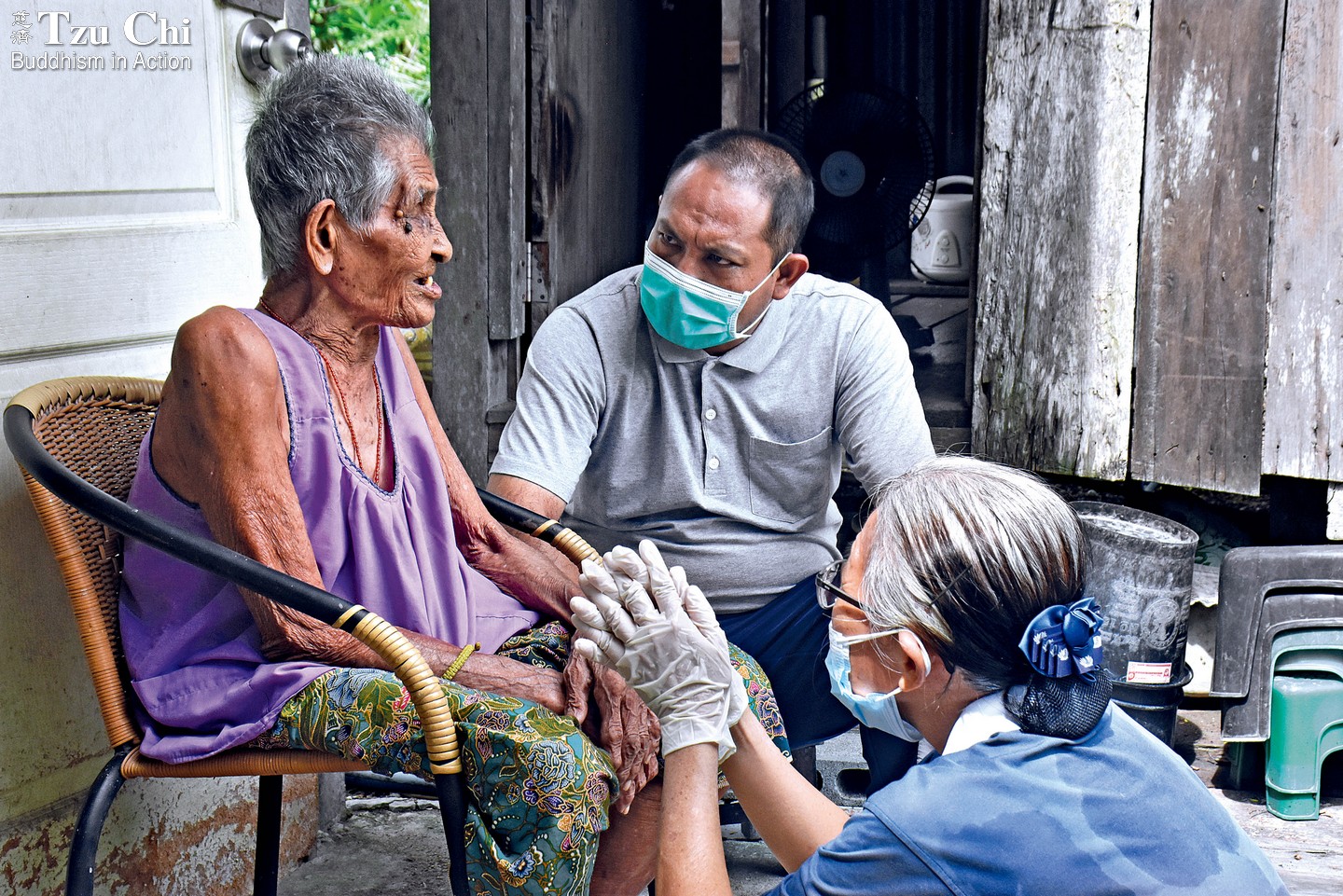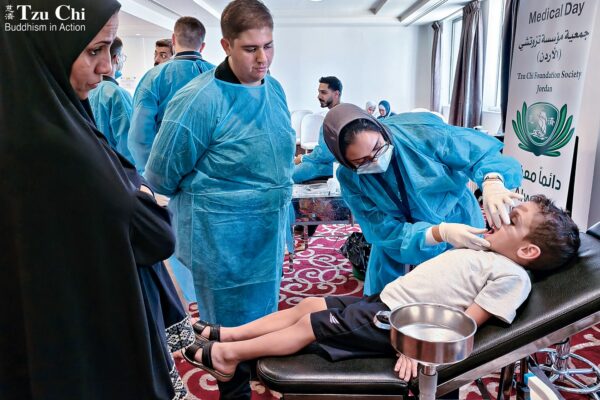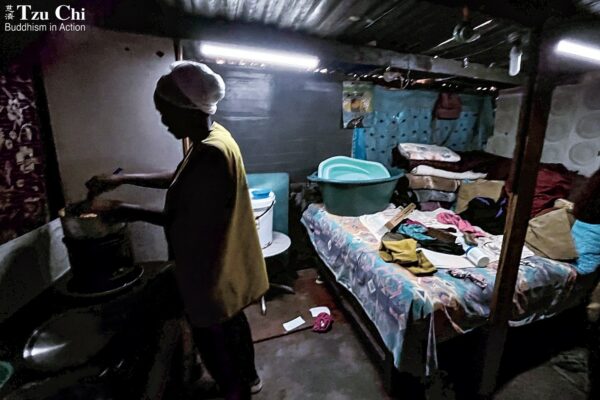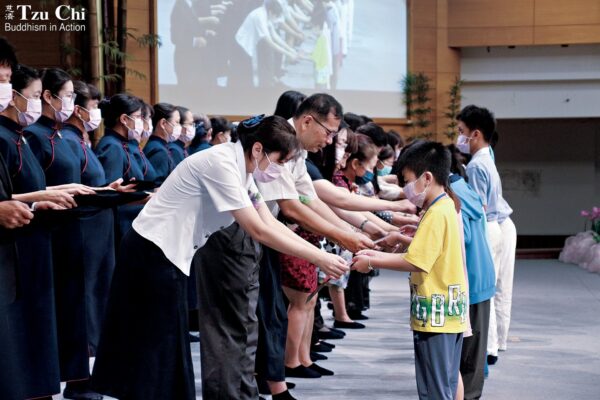By Liao Zhe-min
Translated by Wu Hsiao-ting
Photos courtesy of Tzu Chi Thailand
Everyone fears getting infected with the coronavirus during the COVID-19 pandemic. Many people avoid leaving their homes to reduce the risk. Read how Tzu Chi volunteers in Thailand continue to care for the health of refugees and provide aid for the poor during this challenging period.

Volunteers, wearing masks and gloves to protect themselves, visit a needy person in Thailand in May 2021.
A third wave of coronavirus infections started in Thailand in April 2021. The number of diagnosed cases rose from dozens to hundreds every day; by June, the number of new daily infections had reached into the thousands. All told, the country has recorded more than 190,000 cases since the pandemic began. The latest surge in infections prompted the Thai government to designate Bangkok and its nearby provinces as “dark red” zones—indicating the strictest level of control. Starting on May 1, gatherings were capped at 20 people. Sit-down dining was banned in restaurants; only takeout orders were allowed. Venues where the possibility of infection was higher, such as fitness clubs and gymnasiums, were ordered to close. Business hours at shopping centers and convenience stores were also shortened.
The tightened restrictions made life more difficult for people who worked odd jobs and did not have steady incomes. It also impacted those receiving long-term aid from Tzu Chi. Volunteer Chang Huei-lan (章惠蘭) stressed the need to reach out to people on the fringes of society in a time like this. Love and compassion are required even more in such difficult times. Despite the challenges posed by the virus, volunteers with Tzu Chi Thailand remain committed to aiding the impoverished.
Volunteers have also continued helping the sick. The free clinic center at the Tzu Chi Jing Si Hall in Bangkok, inaugurated in January 2021, caters mostly to refugees and low-income people. Though it is temporarily closed because of the pandemic, volunteers have worked out a way to continue serving patients. Many of the refugees the clinic cares for suffer from chronic illnesses, and their medical needs don’t come to a halt just because of the pandemic. “We must continue giving to them to safeguard their health,” said Chang Huei-chen (張惠珍), head of an administrative team for the free clinic task force of Tzu Chi Thailand. “Our medical service cannot come to a stop.”
Medicine delivery service
Thailand is about 14 times larger than Taiwan, or about the size of Spain. The country hosts many refugees from a variety of other nations. Most do not enjoy the right to work, and their lives are difficult. If they become sick or suffer from chronic conditions, such as diabetes, high blood pressure, or heart disease, they miss out on timely treatment. They just can’t afford the medical bills.
To help address this need, Tzu Chi Thailand started providing free monthly medical services to this group of people in 2015. Over the past six years, they have logged more than 31,000 patient visits. At the beginning of this year, a free clinic center was inaugurated at the Jing Si Hall in Bangkok in order to help even more people in need. The center was open for treatment every Tuesday and Saturday, but had to temporarily close in mid-April due to the pandemic. In the wake of the closure, the center’s medical team became concerned about patients requiring medication for chronic illnesses. They decided to initiate a service to deliver medicine to these patients’ homes to help maintain their health.
The team first reviewed all the medical histories at the clinic to determine which patients might need help. Then they started prescribing medicine for pharmacists to dispense. Volunteers followed up by packing the medicine for delivery. Precautions were taken while the work was being carried out to reduce the chance of infection.
Marinthorn Samlord, a member of the Tzu Chi International Medical Association, helps dispense medicine for the project. “We first check when a patient last obtained his medicine and when he or she will need more. Based on that information, we are able to prepare more for them, so they do not run out during the time of closure.”
Volunteers send some medicine through the mail and deliver other prescriptions in person. They also organized a work relief program through which refugees could be paid to deliver medicine to fellow refugees living near them. No matter how it is distributed, the steady flow of medicine during this time is invaluable. Yasir Medmood, one of the refugees that benefits from this service, said, “I’m an asthma patient, and medications that treat my condition are really important to me. I’m truly grateful to the Tzu Chi team for delivering medicine to my home.”
Most medicine for chronic illnesses can be stored at room temperature, but some, like insulin, needs refrigeration. Volunteers took care of this need too. “We use cold storage boxes that we pack with ice cubes to help the medicine stay fresh during our delivery trips,” explained Sukanya Rimphanawet (林純鈴), CEO of Tzu Chi Thailand.
Patients can also use an around-the-clock hotline or a messaging app to report their health conditions and provide photos of the medications they are currently taking. This allows Tzu Chi doctors to track their condition and adjust their medicine. Chang Huei-chen said that this service and their medicine delivery efforts will continue until the pandemic situation has eased. The free clinic is also planning to implement referral and psychiatric services to safeguard patients’ health in a more comprehensive way.
Tzu Chi Thailand provides long-term care to refugees in the country. Its free clinic center, catering mostly to refugees and low-income people, temporarily ceased operation in mid-April 2021 due to the pandemic. In its place, the medical team there launched a prescription delivery service to continue serving patients.
Distributions for Tzu Chi care recipients
Before the coronavirus pandemic, families under Tzu Chi Thailand’s long-term care would come to the Jing Si Hall in Bangkok at fixed times to receive aid from the foundation. More than 200 families routinely received help this way. But after COVID-19 broke out last year, such distributions were made smaller and spread out over more locations to protect the health of recipients. This new arrangement resulted in more work for volunteers, but they willingly rose to the challenge.
Volunteers Chen Hsiu-chia (陳秀佳) and Chang Huei-lan don face shields, masks, and gloves to help in the smaller distributions. They travel to the event venues in communities to distribute financial aid and daily necessities such as rice, cooking oil, salt, soybean milk powder, toothbrushes, and toothpaste to needy households.
Chang Huei-lan explained that Bangkok covers a large area and has a large population. There is a wide gap between the rich and the poor there. She mentioned a mentally disabled aid recipient who lived in a makeshift shed built of wooden sheets and canvas. His living conditions were terrible. “Tzu Chi’s aid could at least help him stay fed and warm,” said Chang.
Chen Hsiu-chia said that during one of their distributions, they discovered a skip-generation household living next to a sewage ditch. The entire family was jobless. They had no money to buy food, so often went without. After evaluation, the family began receiving Tzu Chi’s emergency aid.
Chang, Chen, and other volunteers realized that though they had no choice but to cut down their home visits to the needy during the pandemic, suffering had continued to exist in many corners of society. They thus could not let up their efforts to give. Though they could not help everyone, one more person helped meant more suffering was relieved.
Looking Back on the Critical Year
By Chang Huei-chen, head of Administrative Team, Free Clinic Task Force, Tzu Chi Thailand
- With the virus looming over everyone and everything, I feel immense pressure making every decision and seeing it through. But the plight of the refugees keeps me and the rest of the team going. Besides trying to reduce our chance of infection, we use technology, a work-relief program, and other ways to continue our medical service for the underprivileged.
Taking precautions while helping others
Chang Huei-chen recalled that when the team at the free clinic center first started delivering medicine to patients, they thought a single set of protective gear each would be enough. But after repeated discussions, they decided to bring extra sets of protective gear and disinfectant alcohol on their delivery trips. They had concluded that it was “better to be safe than sorry” when it came to protecting themselves while helping others. Chang added, “You protect not only yourself but also others when you take proper precautions.”
Chang admitted to feeling fear and anxiety serving others during this critical time. She said that with the virus looming over everyone and everything, she feels immense pressure making every decision and seeing it through. In addition to the fear of getting infected, every team member needs to deal with the stress of being stopped and questioned by the police on their delivery trips. But the plight of patients they serve keeps them going in the face of such challenges. The needy would be left on their own without Tzu Chi’s help, so the volunteers are braving whatever risks they must to continue serving them.
Volunteer Chang Huei-lan also admitted fear about going out to conduct distributions for destitute households during the pandemic. “I’m actually very afraid,” she said. “But if I don’t do it, who else could go out to help?” She knows that under the circumstances, the best thing she can do is protect herself the best she can. She takes all necessary precautions when she goes out to meet the needy, and she takes a shower and changes into a new set of clothing as soon as she arrives home.
Chang’s fellow volunteer Chen Hsiu-chia is just as careful. Protective equipment such as face shields and masks has become a part of her, and she disinfects her hands with sanitizer as often as she can.
When asked, “Why are you still willing to come out to care for needy households in a critical time like this?” they both said that there aren’t many volunteers locally, and considering that older people are at a higher risk for severe illness from COVID-19, they balk at enlisting help from that age group of volunteers. “Since we still have the ability to give,” they said, “we should step forward at a time like this—after taking due precautions.”
With COVID still raging, dedicated and brave volunteers like these in Thailand will keep up their efforts to bring light to dark corners of society.



